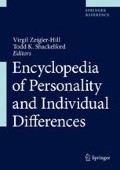Access this chapter
Tax calculation will be finalised at checkout
Purchases are for personal use only
References
Ashton, M. C., Lee, K., & de Vries, R. E. (2014). The HEXACO honesty-humility, agreeableness, and emotionality factors: A review of research and theory. Personality and Social Psychology Review, 18, 139–152.
Beltz, A. M., Wright, A. G. C., Sprague, B. N., & Molenaar, P. C. M. (2016). Bridging the nomothetic and idiographic approaches to the analysis of clinical data. Assessment, 23(4), 447–458. https://doi.org/10.1177/1073191116648209.
Boudreaux, M. J. (2016). Personality-related problems and the five-factor model of personality. Personal Disorder, 7(4), 372–383. https://doi.org/10.1037/per0000185.
Carducci, B. J. (2009). The psychology of personality: Viewpoints, research and applications. Hoboken: Wiley.
Cone, J. D. (1986). Idiographic, nomothetic, and related perspectives in behavioral assessment. In R. O. Nelson & S. C. Hayes (Eds.), Conceptual foundations of behavioral assessment (pp. 111–128). New York: Guilford Press.
Grice, J. W. (2007). Person-Centered structural analyses. In F. Robins & Krueger (Eds.), Handbook of research methods in personality psychology (pp. 557–572). New York: Guilford Press.
Kenrick, D. T., & Braver, S. L. (1982). Personality: Idiographic and nomothetic: A rejoinder. Psychological Review, 89(2), 182–186.
Kline, P. (2013). Handbook of psychological testing. New York: Routledge.
Martin, J. (2005). Organisational behaviour and management. London: Cengage Learning.
McAdams, D. P. (2015). The art and science of personality development. New York: Guilford Press.
McCrae, R. R., & Costa, P. T., Jr. (1996). Toward a new generation of personality theories: Theoretical contexts for the five-factor model. In J. S. Wiggins (Ed.), The five-factor model of personality: Theoretical perspectives (pp. 51–87). New York: Guilford Press.
McCrae, R. R., & Terracciano, A. (2005). Personality profiles of cultures: Aggregate personality traits. Journal of Personality & Social Psychology, 89(3), 407–425.
McCrae, R. R., Chan, W., Jussim, L., De Fruyt, F., Lockenhoff, C. E., De Bolle, M., Costa, P. T., Jr., Graf, S., Realo, A., Mastor, K. A., …, Terracciano, A. (2013). The inaccuracy of national character stereotypes. Journal of Research in Personality, 47(6), 831–842.
McKenna, E. F. (2000). Business psychology and organisational behaviour: A student’s handbook. New York: Psychology Press.
Mount, M. K., & Barrick, M. R. (1998). Five reasons why the “big five” article has been frequently cited. Personnel Psychology, 51(4), 849–857. https://doi.org/10.1111/j.1744-6570.1998.tb00743.x.
Roberts, B., Kuncel, N., Shiner, R., Caspi, A., & Goldberg, L. (2007). The power of personality: The comparative validity of personality traits, socioeconomic status, and cognitive ability for predicting important life outcomes. Perspectives on Psychological Science, 2(4), 313–345. https://doi.org/10.1111/j.1745-6916.2007.00047.x.
Saucier, G., Kenner, J., Iurino, K. M., Philippe, B., Chen, Z., Thalmayer, A. G., Kemmelmeier, M., Tov, W., Boutti, R., Metaferia, H., Cankaya, B., Mastor, K. A., Hsu, K. Y., Wu, R., & Maniruzzaman, M. (2015). Cross-cultural differences in a global survey of world views. Journal of Cross-Cultural Psychology, 46, 53–70.
Terracciano, A., Abdel-Khalek, A. M., Ádám, N., Adamovová, L., Ahn, C.-k., Ahn, H.-n., … McCrae, R. R. (2005). National character does not reflect mean personality trait levels in 49 cultures. Science, 310(5745), 96–100. https://doi.org/10.1126/science.1117199.
Weiner, I. B., & Greene, R. L. (2017). Handbook of personality assessment (2nd ed.). Hoboken: Wiley.
Author information
Authors and Affiliations
Corresponding author
Editor information
Editors and Affiliations
Section Editor information
Rights and permissions
Copyright information
© 2020 Springer Nature Switzerland AG
About this entry
Cite this entry
Mastor, K.A. (2020). Nomothetic Study of Personality. In: Zeigler-Hill, V., Shackelford, T.K. (eds) Encyclopedia of Personality and Individual Differences. Springer, Cham. https://doi.org/10.1007/978-3-319-24612-3_477
Download citation
DOI: https://doi.org/10.1007/978-3-319-24612-3_477
Published:
Publisher Name: Springer, Cham
Print ISBN: 978-3-319-24610-9
Online ISBN: 978-3-319-24612-3
eBook Packages: Behavioral Science and PsychologyReference Module Humanities and Social SciencesReference Module Business, Economics and Social Sciences

